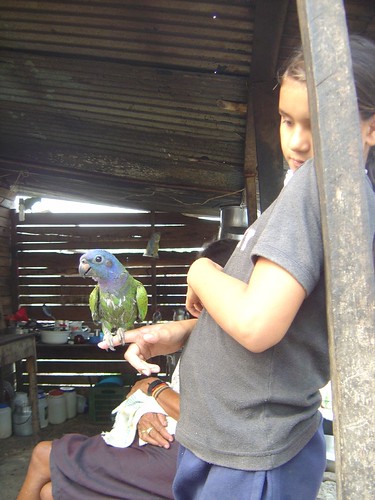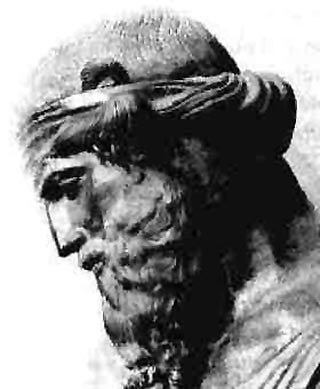 Quico says:
Quico says: So, much as I'd vowed to avoid it, I find myself getting inexorably sucked into the
Maletagate Maelstrom. Too much good stuff is coming
out of Miami not to have a peek. The latest is this leaked,
very long transcript of a 4 hour lunch Guido Antonini and Moises Maiónica had in a Miami restaurant last November the 30th, just two days before the constitutional reform referendum.
First, some brutally abridged background just to bring newbies up to speed. On August 4th, 2007, Venezuelan-American businessman Guido Alejandro Antonini
got busted trying to sneak $790,000 in cash into Argentina on a flight from Caracas. Antonini ran off to Miami where he soon began collaborating with the FBI. He told the feds straight away that the money came from Venezuela's state oil company, PDVSA, and was basically an illegal contribution to
Cristina Fernandez de Kirchner's campaign for the Argentine presidency. As Antonini was talking to the feds, senior Venezuelan officials, facing the mother of all tri-national scandals, dispatched a gaggle of operatives to Miami to try to buy his silence. It is one of those operatives, Franklin Durán, who ended up as the focus of the FBI's investigation and, if convicted,
faces 15 years in jail for conspiracy and acting as an unregistered foreign agent in the US. (The other guys, including Maiónica, eventually copped pleas with the feds and
are now testifying against Durán.)
Throughout their attempts to arrange the bribe, Antonini was wearing an FBI wire. The conversations he picked up shed all sorts of new light into the actual mechanics of chavista corruption, filling in the details on shenanigans we all "know" go down but virtually never get to hear specifics about for the simple reason that the authorities in Venezuela
never investigate this sort of thing.
On this particular occassion, Antonini had the fried calamari, the cotoletta alla parmigiana and the chocolate chocolate cake for dessert. To drink? A
diet coke. With lime. Maiónica shared the calamari starter, then went for the Veal Marsala and finished off with the key lime pie, washing it all down with the obligatory, who-do-ya-think-yer-kidding diet coke. With lime.
The transcript shows clearly that, by November 30th, Antonini's hush money has already been approved in Caracas, but it has not yet been delivered to him in Miami. In fact, the delivery seems to be taking a
long time and Antonini makes a big show of his desperation over the delay, saying he's broke, at the end of his tether, and seriously considering just telling his whole story to the press.
Maiónica tries to mollify him, telling him it's just a matter of fine-tuning the final details before the money can be delivered. He warns him not to do anything stupid, telling him that that would be like "finding out your wife is cheating on you and cutting off your own balls to get back at her."
The chat is brimming with juicy detail. For one, it really leaves no doubt that the order to "deal with Antonini" came from Chávez himself, and more than once. Originally, PDVSA boss Rafael Ramírez was put in charge of keeping the whole situation under control, which makes sense since the original delivery-run to Buenos Aires was a PDVSA operation. When it became clear Ramírez was not up to it Chávez flew off the handle, chewing him out and and handing over responsibility for the affair to Disip (secret police) chief Henry Rangel Silva (of
bank-accounts-frozen-by-the-treasury-department fame).
Maiónica: Chávez sabe que tú te le escapaste de las manos a Ramírez. Lo sabe. Cuando Chávez llama a Rangel es porque Ramírez te sacó la mano. Y le dijo a Ramírez delante de Rangel, "El que se va a encargar de este peo es él".
Antonini: Le dijo.
Maiónica: Entiendes? Entonces todas la consecuencias negativas que significaste pa' Rafael, ya las sufrió. Y por eso es la arrechera que tiene, adicionalmente, me imagino con Franklin [Durán] y con y con Carlos [Kauffman]. | Maiónica: Chávez knows that you slipped through Ramírez' hands. He knows it. When Chávez calls Rangel it's because Ramírez showed your hand. And he told Ramírez, in front of Rangel, "He's gonna take charge of this situation."
Antonini: He told him.
Maiónica: Do you understand? So, all of the negative consequences that you represented for Rafael, he's already been through them. And that's why he's pissed about this in addition to, I think, with Franklin [Durán] and with and with Carlos [Kauffman]. |
So Rangel Silva was left in charge of getting the $2 million to Antonini in a way that could not be traced back to PDVSA, but at the same time would ensure Antonini effectively got the money and kept suitably mum. DISIP was, apparently, having a
lot of trouble figuring out how to pull off the trick, and much of the conversation is a drawn out lament about how useless Venezuelan intelligence is.
When they're not complaining about DISIP, they're talking through the specific mechanics of how to pull off a payment with reasonable deniability. The transcript isn't quite definitive on this - bank details do get exchanged at one point, though it's not exactly clear what for. The overall impression I'm left with is that, at that point at least, they had ruled out using any kind of electronic means to wire the money from PDVSA to Antonini. It was too traceable.
Maiónica: Marico, es que, oyeme, no tienen como. Ellos no tienen como pagarte a ti. La unica ... manera en que Venezuela puede pagar algo con una cuenta de afuera es una transferencia abierta. Y PDVSA no te va a transferir a ti, huevon, eso es, esta clarito. Ni a ti ni a ninguna instruccion que tu des.
Antonini: Claro.
Maiónica: Y eso lo tienes que entender. Porque está de calle. | Maiónica: Dude, it's just that, listen, they don't have the means to do so. They have no way of paying you. The only way Venezuela can pay something with an outside account would be with is an open transfer. And PDVSA isn't going to transfer to you, dude, that's, it's clear ... for you or for any instructions you may give.
Antonini: Of course.
Maiónica: And you have to understand that. Because it's obvious. |
Instead, Maiónica talks repeatedly about having a certain "Cristian" in Caracas go
fetch Antonini's money. And later, he makes it clear that the "secret fund" the payment will come from is a cash stash:
| Maiónica: Pero [funcionar en efectivo] es la unica ... estructura que ellos conocen y, y...ahora que hay miles, si, que tu y yo le pudierarnos dar una clase y enseñarles como, de pinga. Pero es que, no llego a ese nivel de confianza y ademas que, ¿qué hizo el Presidente? Le dijo a Rangel [Silva], "Tú te encargas de este pe'o y tú le pagas". Entonces Rangel tiene una partida secreta, su partida secreta es en dólares en efectivo y va a pagar. Eso es lo que va a hacer. | Maiónica: But [dealing in cash] is the only structure they know and, and... sure there are thousands [of things] that you and I could give them a class on, teach them how [to go about doing things]. Thing is, I'm not on that level of trust with them...plus, what did the president do? He told Rangel [Silva] "You take charge of this mess and you pay him." And Rangel has a secret fund, and his secret fund is in dollars in cash and he's going to pay. That's what he's going to do. |
Which, when you put two-and-two together, sure makes it sound like chavismo's brilliant plan for keeping Maletagate quiet was
to send a flunky to Miami with a suitcase full of 100 dollar bills to pay off Antonini!It's the stuff of comedy this, and I could be misreading it...but it sure seems like this is what they were up to.
To be fair, both Antonini and Maiónica come across somewhat as outsiders to the Bolibourgeoisie...connected, yes, but far from the inner circle. The two talk about the government in the third person. Antonini portrays himself as an innocent bystander, wrongly done in for being at the wrong place at the wrong time, and even suggests at one point that he didn't know the original plane to Argentina was carrying large amounts of cash when he got on it. This was a "vaina" (raw deal) David Uzcátegui had shoved off on him.
Maiónica doesn't dispute that characterization. He tells Antonini that, in his other life he's a corporate lawyer, dealing with mergers and acquisitions, corporate law, that kind of thing. Hell, the guy even says he's
Alberto Vollmer's lawyer!
It's just that he happened to have a government contact. He was friends with a low-level PPT político, Juan Bracamontes, whom he got close to after - this is the kind of thing you just couldn't make up - Bracamontes
stole a student election from Maiónica back in their college days. "We had a fight, which later turned into a friendship...now I'm Godfather to two of his children."
Apparently through Bracamontes, he later struck up a relationship with then vice-president Jorge Rodríguez, did a major bit of business with him, and that, in his telling, is the only reason he ended up getting roped in to intermediating in this whole mess with Antonini.
What's interesting is that the two really don't seem to have a very high opinion of the bolivarian government folk they're dealing with. There's a huge deal of mutual distrust. Much of the conversation revolves around the fact that Caracas wants Antonini to sign some kind of receipt for his bribe (!!!) and Antonini smells a rat. Maiónica says maybe he himself (Maiónica) can sign a sort of receipt on Antonini's behalf, so that Antonini doesn't have to incriminate himself, but this doesn't quite assuage Antonini's concerns:
Antonini: Pero fíjate tu, tú me dices que no tengo que firmar nada. Tú. Pero tú te pones a ver, o sea, tu amigo, o...o, alguien, el, el mastermind de todo esto, algo quería hacer con una firma mía...o sea, joderme.
Maionica: No te iban a hacer nada. No, pana, estás equivocado. Lo que ellos no quieren es que yo me agarre un millón doscientos mil dolares y te entregue ochocientos. Eso es lo que ellos no quieren, huevón. Pero ese es el peo. Qué y con qué son ellos. Cada quien juzga por su condición. ¿Me entiendes? Y no digo Rangel Silva, Rangel es un gocho A-1. Pero es que si no [se firma un recibo] alguien va a pensar que el que se lo cogió fue Rangel. ¿Estás entendiéndome? | Antonini: But check it out, you tell me that I don't have to sign anything. You tell me that. But when you think about it, your buddy, or...or somebody, the the mastermind behind all this, wanted my signature for a reason...in other words, to screw me.
Maiónica: They weren't going to do anything to you. No, buddy, you've got it all wrong. What they don't want is for me to pocket $1.2 million and hand over $800,000 to you. That's what they want to avoid, dude. And that's the rub: who they are and who they mix with. It takes one to know one, understand? And I don't mean Rangel Silva, Rangel is a top notch guy. Thing is that otherwise [without a receipt] somebody will end up thinking it was Rangel who grabbed the cash, are you following me? |
This, I think, it's the single most jaw-dropping bit of the whole 4 hour transcript: Maiónica is shocked,
shocked at the level of corruption in the Venezuelan government! It's
so bad that you can't even serve as the go-between on a simple bribe without people assuming you'll do the normal thing and try to pocket the lion's share...it's comedic gold!
Nonetheless, they seem relieved to be dealing with Rangel rather than with Rafael Ramírez, whom both pour all kinds of scorn on. One of the lovely things about the transcript is that they are, after all, having lunch, so it still includes all kinds of table talk. At one point, as they're sharing an appetizer of fried calamari and talking about their frustrations with PDVSA, we get this gem:
Maionica: Yo lo que creo es que son unos imbéciles. De verdad de verdad. ¿Quieres limón?
Antonini: um hm...
Maiónica: Unos imbéciles, o sea, Rafael sobre todo...
Antonini: No, estoy seguro que son es banana republic... | Maiónica: What I think is that they're a bunch of imbeciles. Really, really. You want some lemon?
Antonini: uh huh...
Maiónica: A bunch of imbeciles, I mean, especially Rafael...
Antonini: Nah, I'm sure they're just banana republic...
|
Which, when you think about it, is pretty remarkable...even their criminal co-conspirators think the guys running PDVSA are useless!
I could go on. There are
155 pages of transcript, so these are just a few highlights. Some key bits are unfortunately unintelligible or inaudible, and through long stretches Antonini seems so agitated it's hard to make heads or tails of what he's saying. The two agree profusely that the one Venezuelan bureaucrat they can respect is Angel Morales, who runs PDVSA Sur (its Argentina + Uruguay subsidiary), and whom they call on the mobile at one point, speaking in a hysterically transparent medical code because they figure Morales's phone is tapped. (The 'prescription' means the receipt, the 'medicine' is the money, and Antonini is 'our sick cousin.')
Parts of it are startlingly personal. The two bond over their shared, humble Italian roots (Maiónica is a first generation Italo-venezolano - his dad is from Trieste - Antonini's third generation - greatgrandpa was a Florentine). They talk about Antonini's relationship with Franklin Durán (he says that, when they first met, Durán was too poor to date respectable La Victoria girls), about their favorite shops, their new watches, their iPhones and Blackberries and Porsches and Mercedeses, about the strain the whole situation is placing on Antonini's family life, how his little daughter is pissed at him because he couldn't go see her school play, about the reporters camped out on his front lawn and Andrés Oppenheimer's repeated, in-person attempts to get him to give a tell-all interview.
In other words, there's
way more material here than I can cover...and this is just
one out of over 200 recordings the FBI made!
It reads, at times, like the script for a thriller, at others like the kind of conversation you have day in and day out with friends and associates, interrupted now and again by a bumbling waiter. By the end, it all seems so very natural, you get so drawn into the text, you almost forget what's really going on...until Maiónica gets up to have a pee and Antonini breaks the illussion by talking straight into his wire, addressing the FBI guy who's recording the whole thing from a van outside.
Ahhhh, maletagate! It's the gift that keeps on giving!
 Juan Cristobal says: The Chávez's administration has a long and distinguished record of pulling the most obscure ñángaras from the gutters of academia and putting them in positions where they can do some real harm. However, the current Minister of Planning, Haiman El Troudi, is in a class of his own.
Juan Cristobal says: The Chávez's administration has a long and distinguished record of pulling the most obscure ñángaras from the gutters of academia and putting them in positions where they can do some real harm. However, the current Minister of Planning, Haiman El Troudi, is in a class of his own.
















